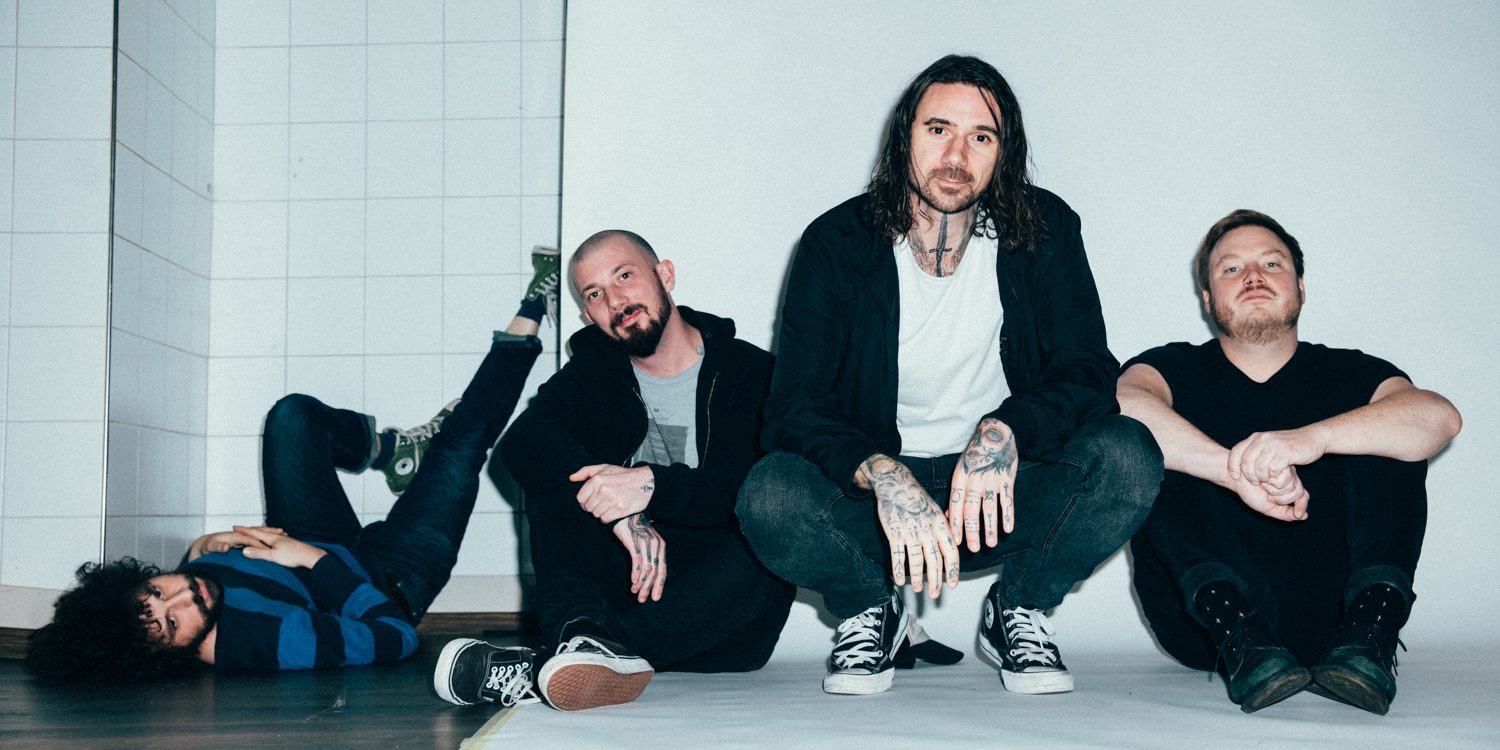Photos courtesy of Andy Ford and Coilguns
UCLA Radio’s Rising Artist Spotlight aims to highlight upcoming artists who have demonstrated unique creativity and talent through their music. Through interviews and features, we delve into their journey, influences, and aspirations, giving listeners a glimpse into the future of music.
Initially hailing from the DIY hardcore scene, Coilguns has crafted their very own blend of punk and ecstatic noise-rock over the past thirteen years. In the lead-up to their fourth solo studio album, Odd Love, I had the pleasure of speaking with Coilguns guitarist and backing vocalist Jona Nido and drummer Luc Hess about looking back on one’s career, the Swiss music scene, and hummus.
This interview was conducted virtually in November and has been edited for clarity and brevity purposes
Interviewed by Dana Badii
Dana: Your next album, Odd Love, is going to be released this Friday. How are all of you feeling in the lead-up to it?
Jona: Excited, but also scared because it’s been quite an investment in time and energy. Even though the human journey it represents has already brought us to a win, now it’s the time where it’s going to be delivered to the public. Everyone can say that they’re not affected, or they don’t care about what people are going to say. But I, though the last couple of years, personally built up some expectations. Now it’s completely out of my hands – so I’m excited, but a bit scared at the same time, but super excited mostly.
Luc: I’m really excited too. We’ve released a lot of singles already, and we’ve had an amazingly good response to them. I’m also a little scared, but I’m very confident. I’m really excited for people to listen to the whole thing and discover the songs they haven’t heard yet.
Dana: I understand those pre-performance jitters when it comes to showing any sort of artwork. Jona, I get your statement about how it’s so easy to just say “I don’t care, whatever happens happens.” But then in the lead-up, you think, “oh wait, what’s everyone going to think?”
Jona: I guess you always do music for yourself. But also, let’s be honest, it’s not about recognition or any kind of stardom. It’s about sharing what we created together as a band of friends with as many people as possible. And of course, it would hit if [the reaction] would feel like it would hurt – if people really hate it. I don’t think this is going to happen for the people following us. But it still has this small buzz to it, like ‘what are people going to think about it?’
Dana: Many of the lyrics from your singles are about aging and looking at one’s older self. You’ve mentioned before that Odd Love is a way to summarize your “relationship with music, the overall music business, and band life.” Can you explain what internalizing Odd Love looks like after thirteen years existing as a band?
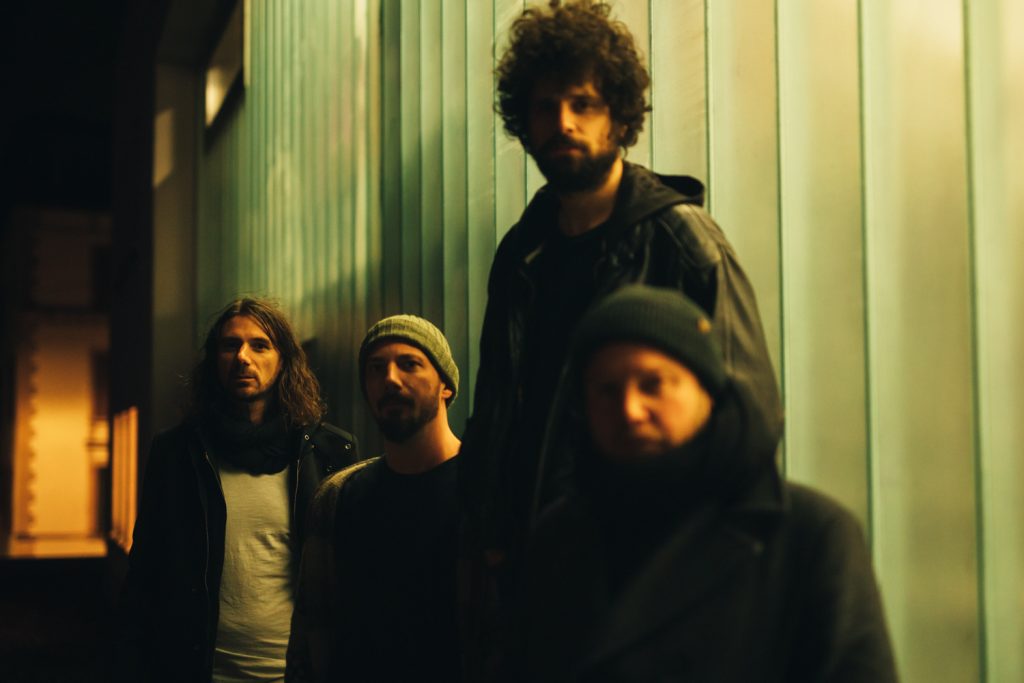
Luc: It’s somehow the ‘odd love’ we share with our music today. We don’t come from a really rough scene. We grew up in Switzerland being in fairly nice families and surrounded by good people, and we chose to make music while maybe lots of people built careers to make money, and we didn’t make money for a long time. But still we keep doing this, which never brought us to any kind of fame and it barely pays the rent. It’s still this outlook towards how we still invest all our time and energy into this band in playing music. It’s also this love that we have together as a band, as friends, as like family; somehow we keep doing this because it is a comfortable life in our minds and artistically, which is not a given thing for all the people who [choose] to have such lives. It is this ‘odd love’ in regards to what we became. And we’re still doing this, and we never hesitated to drop everything else we do, even though we earn money or now we’ve learned how to do jobs within the music industry. We drop everything to go on tour with Coilguns or write something with Coilguns or express something within this band and these people as a family and as friends, as artists.
Jona: This album is the pinnacle of this state of mind. We’re growing older a little bit, and getting towards the moment where everyone is getting a family and having, I would say, normal [priorities]. But what’s normality? Why do we keep doing this? And the only thing that really still makes us gather around this is this weird love that we have for what we do, although we know it’s just like smashing your head into the wall again and again until it breaks. We’re at that point where we’re still acting like teenagers, but we don’t really know why, to some extent, and the reason is just that we created this safe space where we chose to build this family. Now it’s our life somehow. That’s why we’re trying to tell through this the story of love.
Dana: Within so many albums released this year are artists looking back on their lives and realizing they’re getting older and balancing the teenager [self] versus building a family. They don’t know if they want to continue the rockstar life or settle down and have a family with two kids, a picket fence and retire quietly. It’s a struggle. Not everyone can sustain that lifestyle forever.
Jona: It’s only about whether you want to choose to sustain this lifestyle or not. We all made the decision to not have families, to the point where we’re physically not able to have kids anymore. It’s not like we have a rockstar life in the sense that you would expect. We have a modest and humble life trying to play our music, and so now we’ve made a cross on everything else. It’s beautiful to be able to hang out with human beings that are your best friend. It’s been thirteen years, so it’s safe to say that it could go on for a while. There’s no drama in the pipeline somehow. That’s when age starts kicking in; no one does this anymore, unless they’re rockstars. Still, we do it. And I don’t know, that’s a beautiful thing.
Dana: I also want to talk about the music video you released for “Generic Skincare”. It feels so different from your previous music videos: there’s more imagery around it. The lead vocalist, Louis Jucker, walking through town, fading in and out of a different persona with gray hair and a wrinkled face. Tell me some of the creative decisions behind bringing that video for “Generic Skincare” to life.
Jona: We had never done a proper video that wasn’t either [a] live video or some kind of visualizer; we were never so much into videos. And through this one, we thought, “why not go with a production team and special effects and all that.” We wanted to appear in the video which we never did so much before, because we never really wanted to do the ‘whole band playing in a warehouse’ [image] or something like that. But also we never wanted to act, because we don’t know how to act. We had to think about how we could be ourselves into a video and still make it look like it’s been produced to some professional level. Initially, there was a concept about a pharmacy, and we would have been like the [pharmacists], selling medications to people. And then the guy who directed it really chose to go in a weird sci-fi way, with Louis growing older or younger. In the end, it ended up being just a normal [day] in the Coilguns’ life, with Louis basically burning out during the whole clip. It’s just us hanging out, doing interviews, playing, and then walking through the city. It’s a quite literal metaphor for how much we invest into this band. A professional, small band.
Dana: Back to Odd Love as a whole. The album breaks the pattern of Coilguns albums being solely produced, engineered, and mixed by its own members. How come you chose to collaborate with outside producers?
Luc: We produced and did everything by ourselves for a while, and [it] didn’t make sense at this point. We were just feeling like we reached a point where we couldn’t go any further in terms of production and sound. Louis did most of the production before. He started to be a little tired of doing all this plus being a member of the band. We chose Scott Evans to do all the sound engineering parts in the studio, because we all really like his work. And then the work for the mix was done by Tom Dalgety.
Jona: Basically we hit the ceiling at one point with our third album, Watchwinders. And it’s not that we didn’t want to have external opinions, we just never had the time to do it. It’s also a process to accept [involving] other people, and then it’s how you treat [feedback] that is very important. I think we were really on the same page, that we were gladly taking all the feedback and trying things instead of being like “wow, you’re trying to invade my creative space.” And honestly, I think now would be really difficult to do things differently, and especially as Luc mentioned, not having to care about the technical side of things.
Dana: Earlier this year in February, you collaborated with the French hardcore punk band Birds in Row for the joint EP You and I in the Gap. How did Coilguns originally meet Birds in Row?
Jona: We came back from a two year break and we were touring the UK. We were playing a stretch of five shows, and one of them was with Birds in Row. Somehow they knew our band, and we just got along. In 2018, we moved on to do a full tour with them. That’s when we really bonded strongly, and since then, we’ve tried to do things together. We don’t talk regularly, but every time we meet, we just all feel so comfortable with each other. It’s crazy. A French magazine wanted us to do a split album; they wanted us to have one Coilguns song and one Birds in Row song, and none of us had extra songs to give them. So we were like, “whoa, why don’t we get in a studio and just do something all together?” We booked a week and went there, and I don’t know, magic happened. I think if those guys were living closer, we would be best friends and hang out all the time. These are the magical encounters that happen through life for everyone. For us, within the music industry, that was so crazy to meet them and to share so many of their ethics and values and I can’t wait to go back in the studio with them and do more.
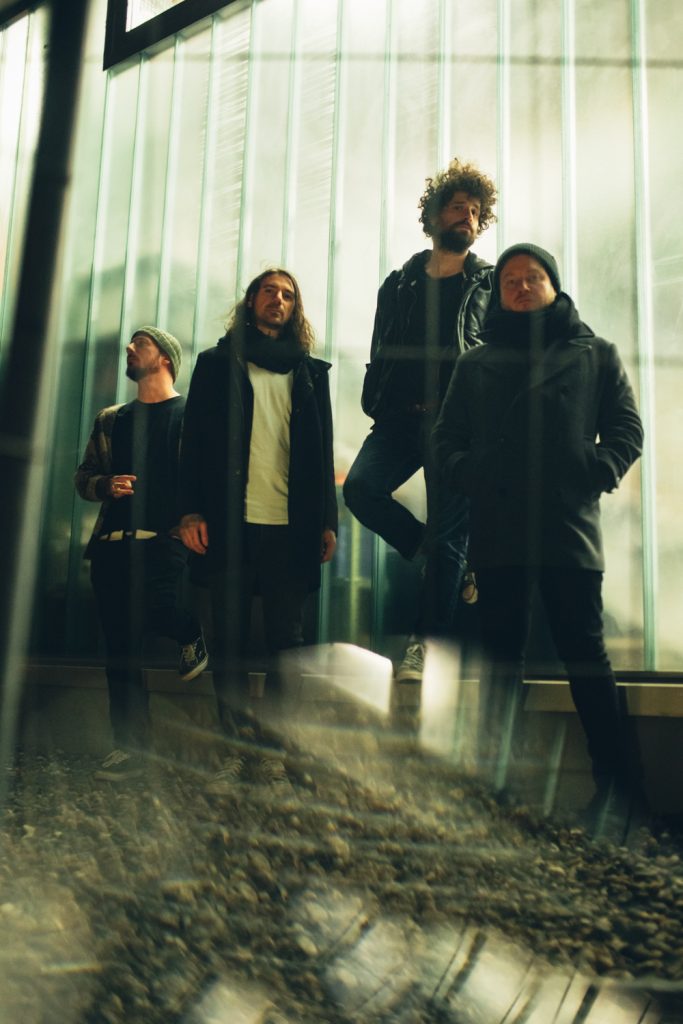
Dana: It’s been mentioned that You and I in the Gap had a strict time limit because it had to have been made in exactly seven days. What created the challenge, and what was the process of creating the EP in such a short amount of time?
Luc: It is challenging to start from a blank page and write material even though we were good friends. We loved each other and had good times on tour with each other, [but] we were complete strangers in terms of playing music together. You dive in, you cruise speed or something, and you work as the full band together. But yes, seven days is a really short time; I’m really happy we did three songs within seven days, because it is short. It’s really challenging, but also very rewarding when you get to the end and you actually have a product, but it was like days that were starting in the morning and were never ending until the end of the night.
Jona: The great challenge is, because it’s so short, you have to make decisions. You can’t really go around and be like, “oh, maybe we should try this or that.” We had two songs with vocals and one heavy song, “You and I in the Gap,” which was instrumentally recorded, but didn’t have any proper overdubs and no vocals. The next day, we were leaving in the late morning. Louis shows up suddenly, and he’s like, “let’s just do one more thing.” He enters the studio and pulls out this amazing vocal take, just one take. No one knew he had lyrics or any ideas, and then he just threw this super angry, mean take. Everybody was flabbergasted, and that was the song we chose as a single, and that was the most streamed song of the piece. These magical moments can only happen when you’re in a rush.
Dana: This question is more so for Jona; you started your label Humus Records to uplift Swiss musicians, and you’ve stated in previous interviews that the label is more than 90% Swiss artists at this point. What did the music scene in Switzerland look like around the time you started Humus Records?
Jona: That brings me back. First of all, I started the label only for Coilguns. I didn’t mean at all to work for other bands. Luc, Louis, and I, before we started the label, were touring with a German band that was quite established internationally. So we’ve toured a lot around the world, we saw a little bit of the ins and outs of the industry, and came back home after we left the band. We said “whoa, there’s not so much structure in Switzerland, but there are a lot of good bands.” Once we started the label and released the first Coilguns EP, a lot of people who do music as a hobby and make their money on the side with good jobs came to us. They produced really decent records, but didn’t know how to promote them or distribute them. They were coming to us because there was this proximity. We’ve had over 150 releases. You guys are from California, right? The whole country of Switzerland is way smaller than California. Maybe you have as many people into noise rock, just in Los Angeles, as we have in the whole country of Switzerland. [With] the scene here, you can’t just stick to one genre or just hang out with one type of people, and that’s what I enjoyed when we started the label. We’re federating a scene of people that wanted to do things. For me, that was beautiful to see all our friends in their 20s starting all these great bands. And no matter if it was electronica, pop, folk, or super satanic black metal, we established ourselves as the common factor between all these artists because we had skills they didn’t, in terms of promotion and distribution [and] all that. For years, we only released first albums from bands no one cared about. A couple of bands popped out, and some of them are touring internationally. That’s how you build a label, I guess. By betting and trying to develop emerging artists.
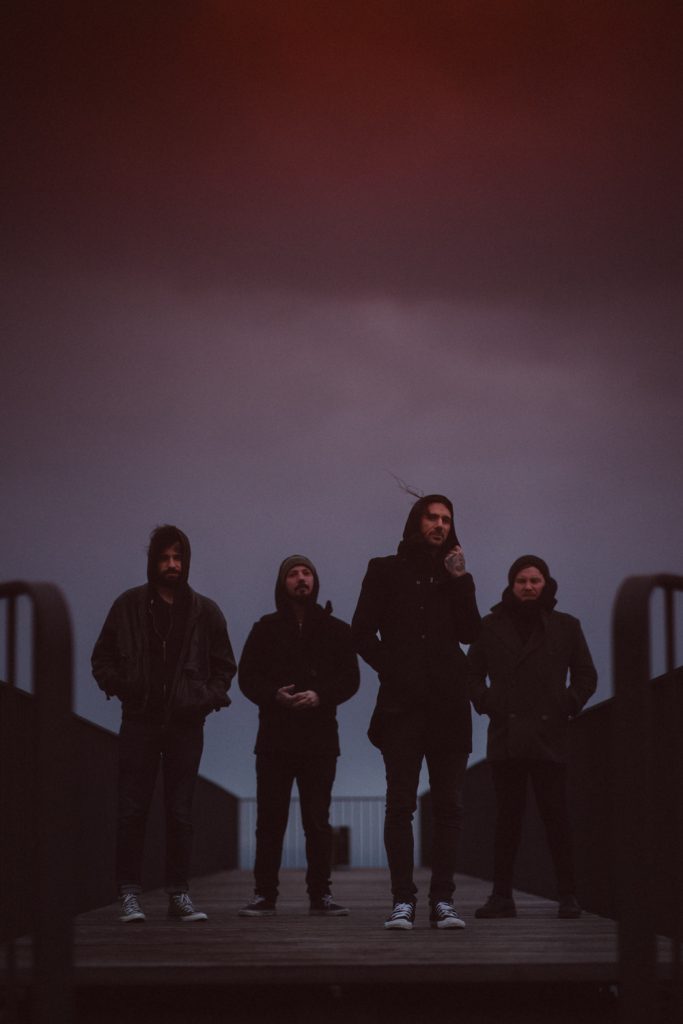
Dana: Switzerland is a country of many languages. You all are from a French-speaking region, but there’s Italian-speaking parts and German-speaking parts. How does language play a role when it comes to organizing bands in the label and interacting with other label members?
Luc: We usually speak English with the German ones. We do have German lessons at school when we’re young, but it’s proper German, which is called Hochdeutsch (translation: High German), and they speak Swiss German, they’re really different from every part, even just within Switzerland. We speak proper French. We have a strong accent from where we’re from, but we can speak French with any French speaking people. Most of the time we talk in English together.
Jona: It’s kind of weird, because it’s no one’s native language, and it’s not a national language, but it’s the language we speak together. With the label, contracts are made in English, and most of the communication with bands that are not from the French parts is in English. So, yeah, it’s kind of weird, isn’t it?
Dana: Why did you name it Humus Records to begin with?
Jona: So as I was saying, the label was initially funded for Coilguns. And at the time, Coilguns was mostly playing small venues, squats, through Europe, and the common point of all these shows when you play squats is that we were having hummus [catered] all the time. Every day. [Louis] called it hummus with two M’s, like the chickpeas, right? So really, not anything conceptually fancy. But eventually, a lot of people were like, “that’s fertile soil because you’re emerging artists.” And they were going on to super fancy explanations. I was like, “no, it’s because we enjoy hummus.” Since then, we have 40 or 50 artists on the label that are not part of the Coilguns joke anymore. It really is a good coincidence in the end, because we took out one “M” two years ago. Now, we’re really called “humus” as in the fertile soil; [it] defines much better the mission of the label nowadays. It makes sense somehow. That’s a happy accident, let’s say. But initially, it was just a joke.
Dana: What’s your favorite type of hummus after all those years of just eating straight up hummus?
Jona: Homemade.
Luc: Lemon and garlic. Lots of lemon and lots of garlic. They beat all the others. They beat the spicy ones!
Dana: How do you see the next decade playing out for Coilguns? The band’s been active for over a decade now. How do you see the rest of the 2020s and even 2030s looking like for the band?
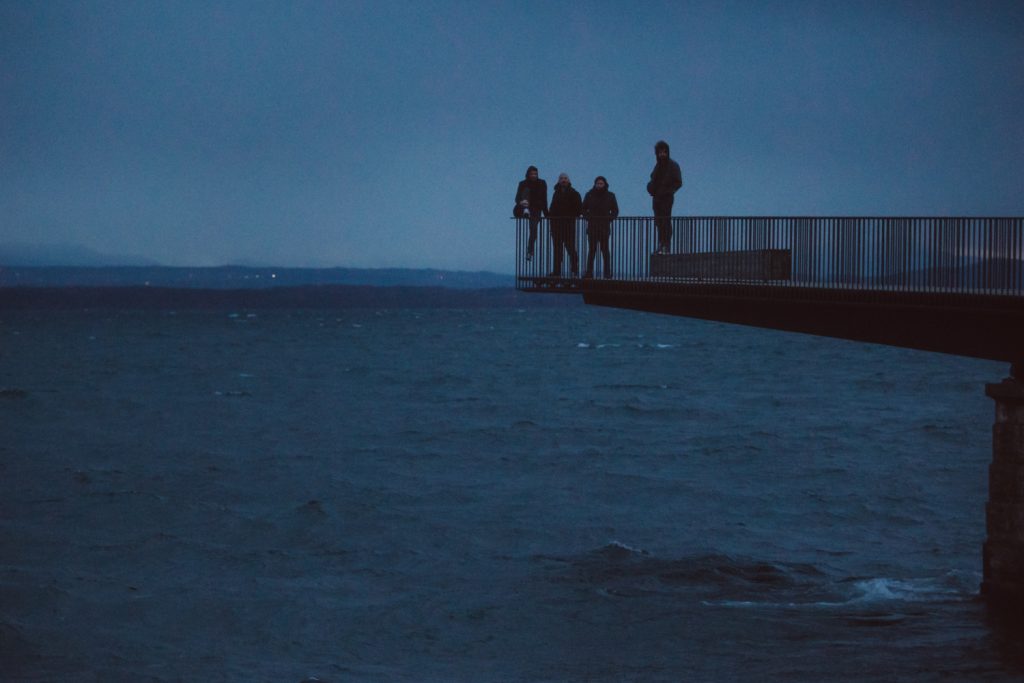
Jona: I hope that we’re still going to be a band; you have to know by now most of our adult life was focused on this. It would be really an earthquake to just shift completely, because we’ve invested so much energy and we feel so good together that there would be no point in doing something else. I would like the band to get bigger and tour more and play to a bigger crowd, to be able to share this with more people. Keep traveling as well. But you know, we don’t know what [or] where the world is going anyway, so I just hope we’re still going to be a band, no matter the shape or form. Even if I had said before within the band, “well, if this album is not working, you know, like, I’m just gonna quit doing this. This is too much, blah blah.” But this is the only one of the only things that keeps me grounded, really. I think there’s always going to be a way to do this band, whether it breaks through or not, because it’s really healing to be in this band. Somehow it has brought so much good to me and to the relation I have with this chosen family within the band, that all I see is that we’re going to keep doing records. I really don’t know the kind of music we’re going to do within the next 10 years, because are we going to be able to do this kind of music? I don’t know. We’ll see.
Luc: To me, this band is a safe space artistically, but [also] humanly, being with such comfortable people, and being privileged enough to share artistic skills and expression as a band and go on the road. I can share my days and nights for weeks and weeks and weeks. It’s also because it’s through music and everything. Are we gonna have a big breakthrough or not, it’s not really even what I think about. But anything can happen. But mostly at this point, I don’t really see [myself] not having this kind of comfortable, safe lifestyle. I don’t feel like living without it, so I’m going with the flow. I’m sure we’re gonna write some new records, some new music. We’re gonna explore and I’m sure it’s gonna be cool. I don’t see us just stopping or shifting away from that unless there’s a social or cataclysmic event that forces us to.
Dana: Who would you say are your biggest inspirations both inside and outside the rock genre?
Jona: One person that has been very inspirational in terms of breaking all the codes and doing their own thing against all odds is Benjamin Weinman from Dillinger Escape Plan, which I saw live for the first time in 2002. When I saw him on stage, I was like, “f***, that’s what I want to do for a job.” Then through touring, not with Coilguns but with this other band, we’ve done a US tour and a European tour with them [Dillinger Escape Plan]. I had the chance to see that guy working, and he’s a manager and working his a** off while no one wanted his band, and he still built this whole career. And honestly, outside of that, I would say that the people that really shaped my playing or will to to be in the industry are all within the rock genre.
Luc: Outside the rock genre, the most influential thing in my life was hip-hop. This guy a few years older than me would make mixtapes for me when hip-hop was new here, I was six or something. That was my first link. To this day, I still love some records, like French hip-hop and American hip-hop records from the 90s. So outside of the rock genre, I would say hip-hop is really something that really played a role and that really inspired me. Within the rock genre, we still play with a lot of rock bands or metal bands, like hardcore bands or post-punk or whatever. And it’s hard to say, I can’t really choose. It’s just going on and on and on and on and it never starts.
Dana: Usually in UCLA Radio, whenever we interview artists, we always ask them what their DJ names would be. What would you two have as your DJ names?
Jona: DJ Labrador.
Luc: Mine would be – oh, it’s easy – some friends found it for me, and it’s actually my Instagram name. It’s Lukessklaer. It’s a pun because Luc is my name, and in French, “caisse claire” is a snare drum. I use it on Instagram now, but some friends were like, “if you would be a DJ, that would be your DJ name.”
Dana: That’s perfect.
Check out Coilguns’s latest album and socials below:

